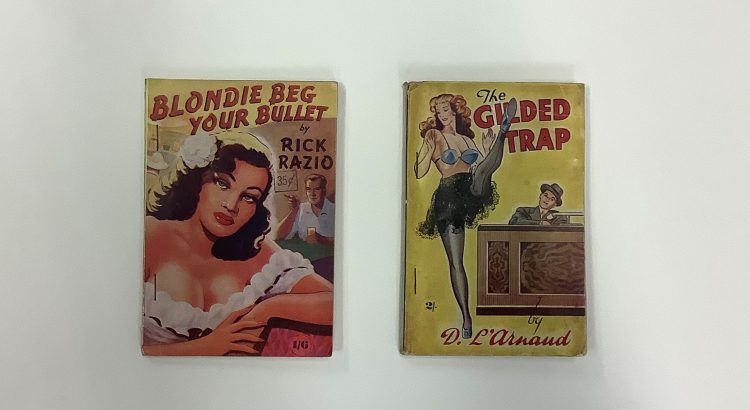The publisher most associated with paperbacks in the UK is Penguin Books who, changed British reading habits forever when they published their first ten titles in 1935. The ten included literary fiction by Ernest Hemingway and Eric Linklater, crime stories by Agatha Christie and Dorothy L. Sayers and the first Penguin book “Ariel” by André Maurois, about the life of the poet Percy Bysshe Shelley.
Penguin were the respectable face of UK paperback publishing, but they had many rivals, some of whom aimed a little more downmarket. Steve Holland has published a history of these purveyors of lurid literary thrills called ‘The mushroom jungle: a history of postwar paperback publishing’. Mushroom because these publishers seemed to pop up in every corner of the country during the 1940s and 1950s, and often just as quickly disappeared.
Holland identifies Glasgow as a hot spot for these mushroom publishers and mentions M.C. Publications Ltd of 9 Caledonian Crescent, Glasgow. Pictured above are two M.C. Publications books, ‘Blondie bite your bullet’ by Rick Razio and ‘The gilded trap’ by D. L’Arnaud. We and Steve Holland do not know much more about M.C. Publications, but we do have copies of these two books in our collections.
‘Blondie beg your bullet’ is both written and narrated by Rick Razio who as the alliterative name suggests owes more than a little to Dashiell Hammett’s Sam Spade. Rick is “the man who makes the gangster’s quake and the women quiver” and does lots of both in the novel’s 128 pages. The book aspires to the style perfected by Raymond Chandler but arguably falls a bit short. Where Chandler gives us “It was a blonde. A blonde to make a bishop kick a hole in a stained-glass window” Razio has “The first time I’d happened to turn my lamps on Lyn, the sight abstracted my breath and set my blood pumping up a whole lake of desire.” As carnival barkers used to say when you just failed to hit the target “close, but no cigar”.
The book is full of mentions of bourbon, Cadillacs, and blondes, sometimes managing to get all three into the same sentence. It also suggests all sort of lurid goings on without describing them. The danger of prosecution for obscenity means the reader’s imagination must fill in a lot of gaps. Despite this the novel manages to be both overheated and lurid throughout.
The other M.C. Publication we have is ‘The gilded trap”. The book helpfully has a synopsis, which as well as giving a summary of the story shows that the blurb writer’s grasp of grammar is as poor as the quality of the paper it is printed on.
Sally Marshall strongly fascinated by the glitter of the footlights runs away from home meets producer Leonard Linnet. Sally refuses his advances, only to find that she has been trapped by a white slave gang. Can Sally Marshall be released from the trap, read how her mother’s murder is avenged and what happens to Sally.
Thankfully, things turn out all right for Sally, but things do not seem to have turned out so well for M.C. Publications. The back cover of ‘Blondie beg your bullet’ says that another Rick Rizio winner ‘Blondie kiss your doom’ is in preparation but copies will be scarce. We have been unable to identify a copy and are not sure if it exists. Pulp fiction was profitable, but you had to sell around 30,000 copies of each title and competition was fierce, so M.C. Publications likely had a short life.
Though based on an American model the books were almost certainly written by anonymous British hack writers forced to churn out up to 10,000 words a day to make a living. So, it is interesting that one of the books has a 35 cents stamp on the cover suggesting they were sold in America. That these British imitation American thrillers had an American market is the literary equivalent of selling coals to Newcastle.
Steve Holland’s is a fascinating and deeply researched study of the history of British paperbacks and recommended. The M.C. Publication titles are quick and easy reads, though you do get the feeling they might have been written at the same speed as you are reading them.
Further reading/links:
Steve Holland. ‘The Mushroom Jungle’ 1993. (shelfmark: HP2.94.7662)
Rick Razio. ‘Blondie beg your bullet’ [194?]. (shelfmark: PB2.214.86/7)
D. L’Arnand. ‘The gilded trap. [194?]. (shelfmark: PB2.214.119/2)
A page from ‘Thrilling Detective’ website on Hank Janson who arguably started the boom in American inspired British pulp fiction is here
